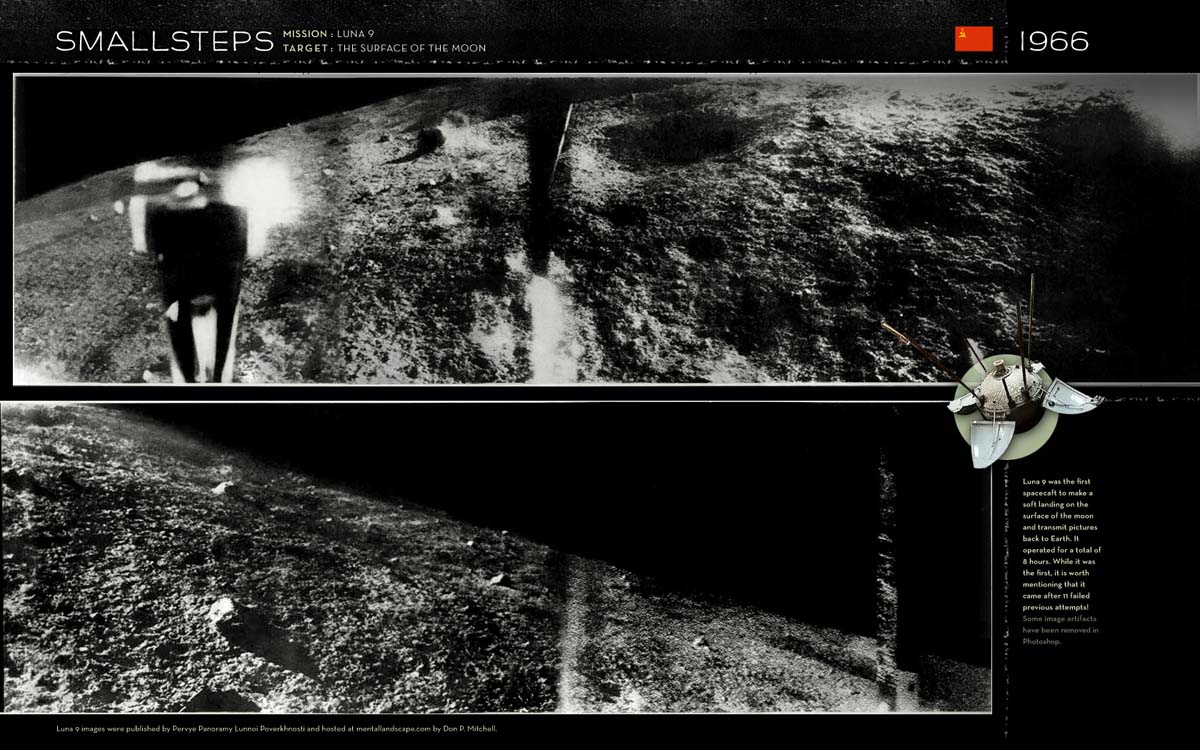Difference between revisions of "February 3, 2011"
| Line 7: | Line 7: | ||
<em>image by [http://wanderingspace.net/2007/09/smallsteps-wallpaper-luna-9/ Don P. Mitchell]</em><br /> | <em>image by [http://wanderingspace.net/2007/09/smallsteps-wallpaper-luna-9/ Don P. Mitchell]</em><br /> | ||
<br /> | <br /> | ||
| − | Today marks the 45th anniversary of the Russian Luna 9 (Lunik 9), the worlds first softlanding on another planetary body - our Moon. The landing helped spur on the Space Race as another step on the road to the Moon. [http://en.wikipedia.org/wiki/Luna_9 Luna 9] landed on February 3, 1966 at 18:55 UT in [https://the-moon.us/wiki/ | + | Today marks the 45th anniversary of the Russian Luna 9 (Lunik 9), the worlds first softlanding on another planetary body - our Moon. The landing helped spur on the Space Race as another step on the road to the Moon. [http://en.wikipedia.org/wiki/Luna_9 Luna 9] landed on February 3, 1966 at 18:55 UT in [https://the-moon.us/wiki/Planitia_Descensus Planitia Descensus] the "Plain of Descent" near [https://the-moon.us/wiki/Cavalerius Cavalerius] and [https://the-moon.us/wiki/Reiner_Gamma Reiner Gamma] in [https://the-moon.us/wiki/Oceanus_Procellarum Oceanus Procellarum] region. The [http://www.jodrellbank.manchester.ac.uk/multimedia/images/moon-luna9.html first images] sent back were intercepted by the Jodrell Bank radio telescope observatory near Manchester in England, and they were turned into images using a fax machine. However they did not know what aspect ratio the Soviets were using for decoding the images. The [http://www.jodrellbank.manchester.ac.uk/multimedia/images/moon-luna9.html resulting image] which was released to the press ahead of the Soviets showed a much more rugged moonscape than in the image above. The Soviets were not impressed. But the world got to see the lunar surface earlier than would probably been the case. Luna 9 transmitted back three complete panoramas of the surface and moved slightly between the first and last pan as it settled on the lunar surface. Luna 9 was great achievement, one of the first small steps on the road to the Moon, and our first look at the surface before [http://nssdc.gsfc.nasa.gov/nmc/spacecraftDisplay.do?id=1966-045A Surveyor] starting in May 1966 and later Apollo 11 in 1969.<br /> |
<br /> | <br /> | ||
[mailto:mauricejscollins@hotmail.com Maurice Collins]<br /> | [mailto:mauricejscollins@hotmail.com Maurice Collins]<br /> | ||
| Line 19: | Line 19: | ||
[http://nssdc.gsfc.nasa.gov/nmc/masterCatalog.do?sc=1966-006A Luna 9 NSSDC]<br /> | [http://nssdc.gsfc.nasa.gov/nmc/masterCatalog.do?sc=1966-006A Luna 9 NSSDC]<br /> | ||
[http://www.jodrellbank.manchester.ac.uk/multimedia/images/moon-luna9.html Jodrell Bank image]<br /> | [http://www.jodrellbank.manchester.ac.uk/multimedia/images/moon-luna9.html Jodrell Bank image]<br /> | ||
| − | Rükl plate [https://the-moon.us/wiki/R%C3% | + | Rükl plate [https://the-moon.us/wiki/R%C3%BCkl_28 28]<br /> |
<br /> | <br /> | ||
<p><b>Yesterday's LPOD:</b> [[February 2, 2011|The Classics]] </p> | <p><b>Yesterday's LPOD:</b> [[February 2, 2011|The Classics]] </p> | ||
Latest revision as of 18:46, 13 October 2018
Smallsteps - Luna 9

image by Don P. Mitchell
Today marks the 45th anniversary of the Russian Luna 9 (Lunik 9), the worlds first softlanding on another planetary body - our Moon. The landing helped spur on the Space Race as another step on the road to the Moon. Luna 9 landed on February 3, 1966 at 18:55 UT in Planitia Descensus the "Plain of Descent" near Cavalerius and Reiner Gamma in Oceanus Procellarum region. The first images sent back were intercepted by the Jodrell Bank radio telescope observatory near Manchester in England, and they were turned into images using a fax machine. However they did not know what aspect ratio the Soviets were using for decoding the images. The resulting image which was released to the press ahead of the Soviets showed a much more rugged moonscape than in the image above. The Soviets were not impressed. But the world got to see the lunar surface earlier than would probably been the case. Luna 9 transmitted back three complete panoramas of the surface and moved slightly between the first and last pan as it settled on the lunar surface. Luna 9 was great achievement, one of the first small steps on the road to the Moon, and our first look at the surface before Surveyor starting in May 1966 and later Apollo 11 in 1969.
Maurice Collins
Technical Details
See Wiki page
Related Links
Luna 9 panoramas
Zarya - Luna 9 page
Luna 9 NSSDC
Jodrell Bank image
Rükl plate 28
Yesterday's LPOD: The Classics
Tomorrow's LPOD: Wolf Moon Over Tucson
COMMENTS?
Register, Log in, and join in the comments.



